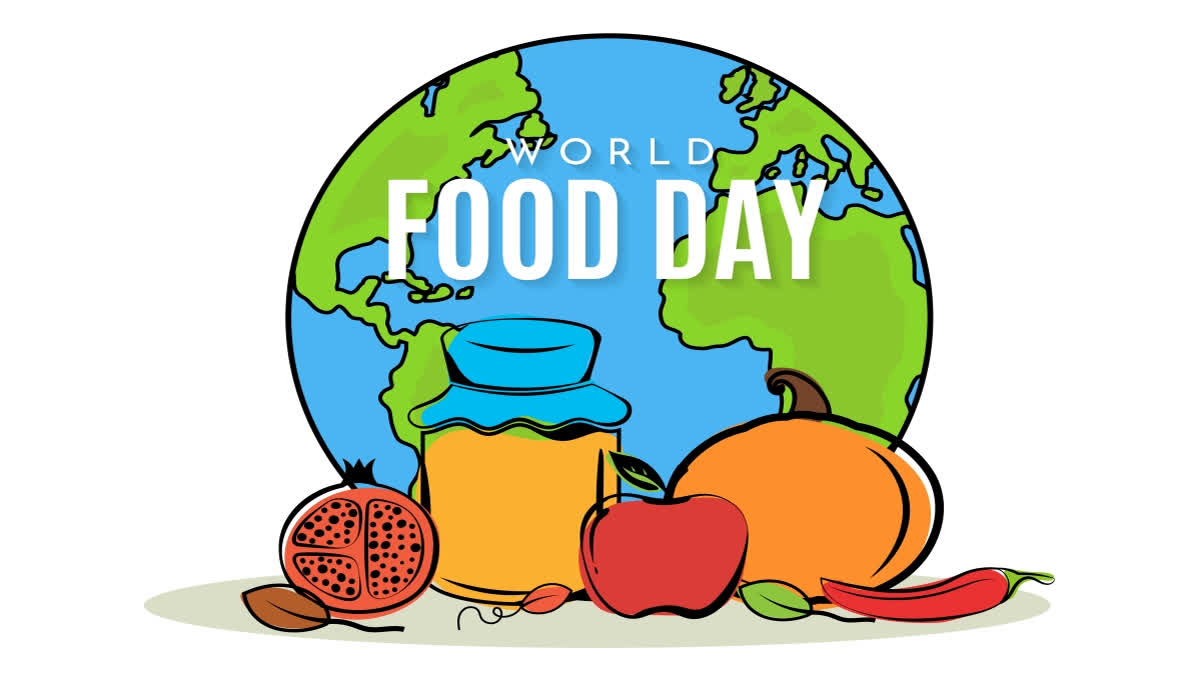Hyderabad: World Food Day is observed on October 16 every year with an aim to emphasise the promotion of safe food production, adequate nourishment, and increased awareness about the significance of a healthy diet.
Theme- World Food Day is observed every year based on a particular theme. This year the event is based on the theme “Water is food, water is life, leave no one behind, underscoring the pivotal role of water in food security.
Significance- Ensuring a nutritious diet in sufficient quantities is crucial for maintaining good health and well-being. Healthcare professionals universally emphasise the importance of consuming a balanced diet tailored to individual needs. However, economic constraints and other factors often obstruct people from accessing the necessary amount of food.
History- The day was established on Oct. 16, 1979, by the Food and Agriculture Organization of the United Nations. World Food Day addresses global hunger and aims to eradicate it. Initially recognising food as a universal right, the United Nations later acknowledged the need for a healthy diet for all in 1945, emphasising its importance.
-
Water is one of the world's most precious resources.
— United Nations (@UN) October 16, 2023 " class="align-text-top noRightClick twitterSection" data="
Yet, its availability & quality are deteriorating at an alarming rate.
On Monday's #WorldFoodDay, @FAO explains how we can all take water action for the future of food, people and the planet. https://t.co/qFE10jzY2s pic.twitter.com/xj1F3FjpfL
">Water is one of the world's most precious resources.
— United Nations (@UN) October 16, 2023
Yet, its availability & quality are deteriorating at an alarming rate.
On Monday's #WorldFoodDay, @FAO explains how we can all take water action for the future of food, people and the planet. https://t.co/qFE10jzY2s pic.twitter.com/xj1F3FjpfLWater is one of the world's most precious resources.
— United Nations (@UN) October 16, 2023
Yet, its availability & quality are deteriorating at an alarming rate.
On Monday's #WorldFoodDay, @FAO explains how we can all take water action for the future of food, people and the planet. https://t.co/qFE10jzY2s pic.twitter.com/xj1F3FjpfL
On this occasion, people are not only motivated to make efforts in the direction of food production in community or large groups, but small units like single or family are also motivated to adopt small farming methods so that people can be motivated to produce food in large or small groups and they can also grow and consume healthy food in the required quantity.
Despite advancements in the food industry worldwide, many countries still grapple with inadequate access to a healthy diet and dwindling food production. Factors such as inflation, poverty, social inequality, environmental issues, conflicts, and epidemics contribute to this challenge. Experts consider this a critical global issue affecting numerous nations.
Concerning data- A significant proportion of India's population—around 71% or over 97 crore people—struggle to afford nutritious food, as reported in the United Nations' 'The State of Food Security and Nutrition in the World 2022.' This issue is prevalent in various countries, underscoring the need for urgent action and global cooperation to address malnutrition and insufficient access to healthy food.
The neighboring country, Nepal is ahead of India in these trends. Around 84% of Nepal's population is struggling to afford nutritious food, The figure remains staggering in Pakistan(83.5%), Sri Lanka(49%). Countries like Brazil(19%) and China (12%) have kept themselves in a much better state.
The report also stated that even though India ranks second in the world in food production and ranks first in the production of pulses, rice, wheat, fish, milk and vegetables worldwide, still our country has a large population suffering from malnutrition.
According to the 2021 report of the UN, around 76.8 crore people of the world were found to be victims of malnutrition, out of which India alone accounts for 22.4 crore, i.e. about 29% of the affected populace.
United Nations statement- On the account of World Food Day, Antonio Guterres, Secretary-General of the United Nations, said, "The crisis of food scarcity demands action – first and foremost from national governments, which have a responsibility to make sure their people have enough to eat. But many governments lack the resources to do so, and so effective international solidarity is also essential."
Guterres further explained, "The long-term causes of the global food crisis include conflicts, climate extremes, inequality, and economic instability. The UN system is addressing these root causes through our support for sustainable, equitable food systems that put people over profits. That means massively scaling up investments in resilient agriculture, and aligning them with climate action.
UN Secretary-General also claimed that zero hunger is achievable if the governments, the private sector, civil society and academia join hand and work together on prioritising feeding the hungry and to bring an end to this crisis. "All of us have to invest in long-term solutions that provide everyone with enough to eat," Guterres concluded.



